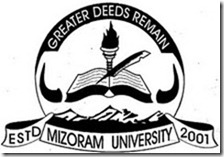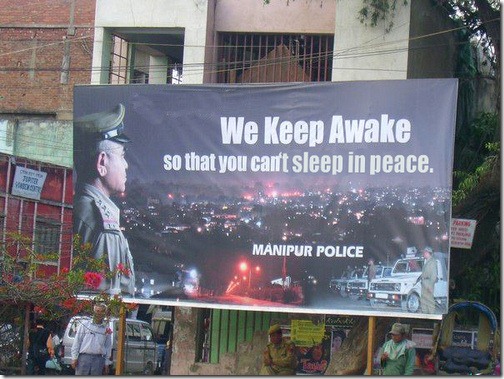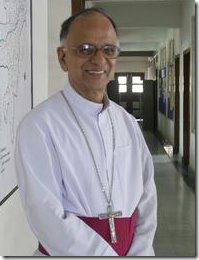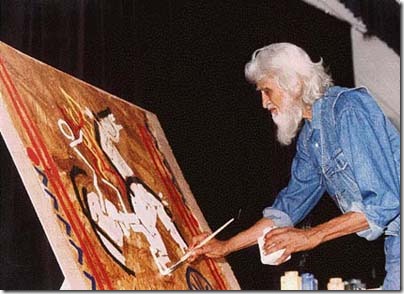By Milind Kokje

Image: Javed Choudhary
The midnight police action against Baba Ramdev and his followers at Delhi’s Ramlila Maidan may cost the ruling Congress Party dearly. And surely they are not unaware of this.
Having said that, we must also concede the fact that the Congress showed guts by taking the risk to finally show the world who really calls the shots.
When Anna Hazare, and then Baba Ramdev, entered the political theatre without wearing any party badge and started coercing the administration with their diktats, the government initially gave in for some time.
It even accepted Hazare’s demand of participation in the Bill drafting process, though in fact that is the job of the government and Parliament. It also held several ministerial level dialogues with Baba Ramdev. But it was all in vain, with the yoga guru remaining adamant about his scheduled fast. This finally forced the government to act against him.
Thanks mainly to the immature media, which thrives on drama and entertainment, Hazare and Ramdev became instant national heroes.
But though it played a crucial role, one cannot blame just the media. One must understand that the media has a limited role and impact. The issues have to be sufficiently hot and appealing to the public for sustained media coverage.
The method of agitation also plays a critical role. A public meeting or a morcha has limited exposure as it gets over in a few hours, as against a dharna or a fast which can go on for days, ensuring prolonged media coverage. A fast is even much more effective, since it creates an image of someone willing to sacrifice everything, even life, for a social cause. And since no government can risk being seen as apathetic towards someone willing to risk his life for a cause, the chances of success are high.
Hence an indefinite fast has become the preferred weapon of such activists because it generates prolonged media publicity on one hand and puts pressure on the government to accede to their demands on the other.
In order to extricate itself from such situations, sometimes the government gives in to the demands, without really considering whether the cause is really just for everybody concerned.
Take the case of Medha Patkar’s recent fast in Mumbai for Golibar slum colony people. The Maharashtra government accepted all her demands, only to face another group of people from the same colony taking out a morcha protesting against Patkar’s role and the state government for acceding to her demands.
Which is why such fasts and other coercive tactics are now being viewed with increasing scepticism by both the public and the government.
But the real reason for the rise of people like Anna Hazare and Baba Ramdev is the complete vacuum in the real political arena caused by the complete erosion of credibility of all parties and their leaders.
No political party can really organize and lead such an agitation against corruption. Even if they did, they would not garner the same level of public support.
The people have no faith in political parties and leaders, and hence they are moving towards such non-party leadership.
For instance, the BJP has openly supported Ramdev. But the question is, why didn’t the party organize such an agitation or fast on its own? The answer is simple: its past while in power at the centre will haunt it, and so will the situation in Karnataka. And that is the weakness of every party in the country.
The inability of mainstream political parties to launch such agitations with popular support, and the growing support for such movements by non-party leaders is not a good sign.
In a democracy, people elect their representatives to enact laws and to look after their problems. Civil society, different organizations, independent leaders do have a role to play in highlighting certain issues and problems. But this is a limited role. Crossing those limits can undermine the democratic institutions, which will create new problems.
If the babas and other gurus are to be stopped from taking centre-stage with popular public support, political parties and leaders of all shades will have to indulge in some serious introspection. They will have to bring in changes within to instil confidence among the people, make them believe that they are reliable, trustworthy, non-corrupt. They will need to leverage their bonds with the masses, and make them believe that they –and the system—work for the public good.
It is time the political parties took serious steps to re-establish their credibility. Only then the people will turn to them once again.










 Guwahati, Jun 9 : With an aim to help the tribal women, Assam government has organized a month-long handloom workshop in Guwahati. It is being attended by 50 women from various self-help groups and NGOs in the region.
Guwahati, Jun 9 : With an aim to help the tribal women, Assam government has organized a month-long handloom workshop in Guwahati. It is being attended by 50 women from various self-help groups and NGOs in the region. 


